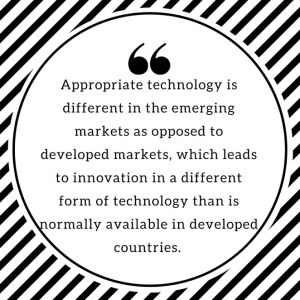by Caroline Peters, Strategic Emerging Market Analyst at U.S. Green Chamber of Commerce
Contemporary sustainability analysts have seen a shift from a philanthropic basis of sustainability to a practical one in seeing the positive results in emerging markets. These emerging markets know the value of the triple bottom line through their various approaches, including innovation for the bottom of the pyramid, leapfrogging past developed markets’ mistakes and an increased sustainability in specific industries, especially water technology, agriculture and tourism.
Professor Mark White, business sustainability analyst and researcher at the University of Virginia, provided some insight into the advantages of the emerging markets system of sustainability. Most importantly, emerging markets have been able to learn from the mistakes of already developed and stable markets.
Telephone poles and brick and mortar banks are not necessary to build when technology can leapfrog past wasteful physical structures in traditional forms of development. Technological innovation, like Venmo, online banking, telecommuting, and wireless phone service, will change the shape of economic innovation within emerging markets and provide for a shift from using sustainable practices for philanthropic reasons to economic ones. However, as technology grows, so does the amount of energy and electricity needed.
Secondly,  the bottom of the pyramid, defined by the bottom $2 billion of wealth earners, have needs that are serviced differently than the top of the pyramid. This means that there should be a focus on long-lasting products with easy to replace parts. Appropriate technology is different in the emerging markets as opposed to developed markets, which leads to innovation in a different form of technology than is normally available in developed countries. Using less sophisticated tech innovation will allow for easy replacement.
the bottom of the pyramid, defined by the bottom $2 billion of wealth earners, have needs that are serviced differently than the top of the pyramid. This means that there should be a focus on long-lasting products with easy to replace parts. Appropriate technology is different in the emerging markets as opposed to developed markets, which leads to innovation in a different form of technology than is normally available in developed countries. Using less sophisticated tech innovation will allow for easy replacement.
Finally, developing markets have much to teach developed markets. For example, the Costa Rican agricultural industry implements strategic sustainable practices to boost both profits and ability for long-term growth. Knowing to preserve trees, phase out pesticides, and promote a stable habitat for the  environment, the Costa Rican coffee industry is providing for the long-term economic growth of its country much better than its developed predecessors. While these sustainable efforts might have been just viewed as a PR plan 10 years ago, sustainable practices are paying off economically. With this boost in forestation, the tourism industry is booming, rising to the most profitable industry in Costa Rica. From this rise in tourism comes the rise in the ecolodge, or the sustainable hotel that provides a positive and relaxing experience while also playing a role in creating a sustainable future for Costa Rica. This anecdote makes it clear how important one act of sustainability is in regards to the ecosystem of the country.
environment, the Costa Rican coffee industry is providing for the long-term economic growth of its country much better than its developed predecessors. While these sustainable efforts might have been just viewed as a PR plan 10 years ago, sustainable practices are paying off economically. With this boost in forestation, the tourism industry is booming, rising to the most profitable industry in Costa Rica. From this rise in tourism comes the rise in the ecolodge, or the sustainable hotel that provides a positive and relaxing experience while also playing a role in creating a sustainable future for Costa Rica. This anecdote makes it clear how important one act of sustainability is in regards to the ecosystem of the country.
While the developed markets may have a leg up in historical knowledge and high-tech innovation, developing markets have much to teach the international community when it comes to sustainable business practices. Emerging markets have chosen to switch their philanthropic sustainable practices to economically-incentivized ones once they see the positive effect on long-term growth.







